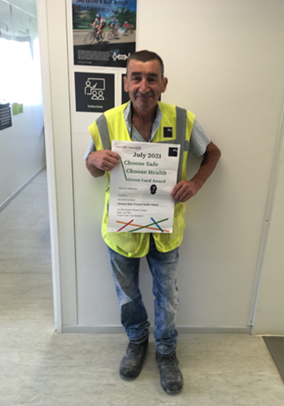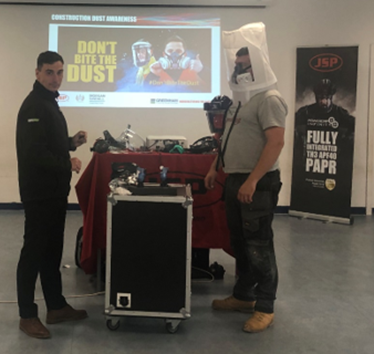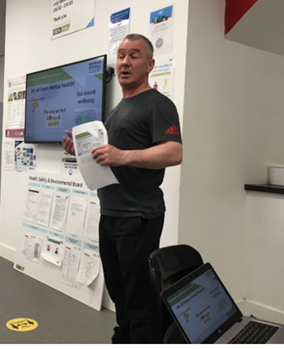Making construction sites safer places to work
All of SCF’s contractors have a policy of positive intervention to increase safety and minimise the chance for incidents on site. These can take many forms, but a number are common to most contractors. All operatives must hold the necessary safety licenses before they arrive on site, and perhaps the most common on-site activity is the Safety Toolbox Talk. These take place regularly on site and depending on the topic will be aimed at some or all operatives on site. Topics might include the dangers of dust and how to control it and mitigate its effects to preventing objects being dropped from height. Increasingly toolbox talks address healthy lifestyle and mental health too.
During the last quarter, the ten SCF contractors delivered 754 toolbox talks.
An increasingly common practice is to award operatives who provide an improvement in the way a task is undertaken. This recognises the individual’s achievement and also helps inform improved practice. An example of ISG’s awards include an award and gift voucher to Chris Hood of RM Penny who was recognised as constantly working safely and setting a good example to others. Chris made a number of suggestions to improve work practices which improved safety standards and helped to eliminate exposure to occupational health risks.
Another was made to James Hall, also of RM Penny, for devising a way for ‘scrabbling’ concrete more safely. Scrabbling concrete provides a key for the next process by exposing the aggregate already dry concrete and creates dust containing silica which is often mitigated by the use of dust extraction and noise protection equipment. James proposed and used a Liquid Top Face Retarder. This is a non-hazardous, fully biodegradable liquid applied to the concrete before it sets.
Once the concrete has set the following day the area is jet washed to safely expose the concrete aggregate.
All SCF contractors have signed up to work towards the CLOCS Standard (Construction Logistics and Community Safety) which is a protocol to reduce traffic accidents involving construction vehicles. During the last quarter, Willmott Dixon delivered 17 enhanced Site Access Traffic Marshal training courses as part of their drive to improve the safe flow of vehicles to and from sites, resulting in 68 newly trained traffic marshals.
SCF’s contractors will also run campaigns throughout their businesses which may be specific or wide ranging. Morgan Sindall held a National Health Week which promoted both good occupational health practice and the benefits of a healthy mind and body.
The campaign engaged staff and supply chain members at all projects around the UK through on-site training sessions, virtual events, daily blogs and leadership visits throughout the business focusing on health.
Some highlights from the week were:
- Delivery of a virtual Mental Health and Wellbeing session by Morgan Sindall’s in-house approved mental health instructors as well as delivering the Building Mental Health Bronze Toolbox talk at all locations.
- Promotion of an Employee Assistance Programme which the company recently extended to their supply chain staff giving them 24/7 access to support if required.
- Delivery of dust awareness sessions throughout the UK and provided face fit testing and face fit testing kits to 69 supply chain supervisors at 7 projects throughout the UK giving them the skills and tools to ensure their employees have adequate protection when using Respiratory Protective Equipment.
- Providing lifestyle assessments to 40 supply chain staff at two SCF projects which resulted in a number of referrals for high blood pressure and cholesterol which may have gone undiagnosed.






